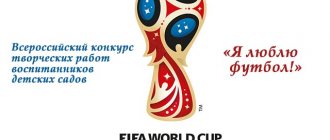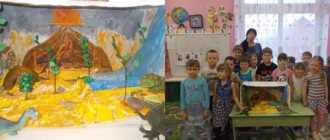What to call a children's club, kindergarten?
Coming up with a name for your children's center is almost as responsible and sometimes as difficult as giving a name to your child.
To be successful, a children's club must surprise. Imagine: a mother walks into a children's club. Let's say it's called "Rainbow". He sees that the chairs are exactly the same as in kindergarten, only newer. The cabinets are from the neighboring furniture store. Toys from Detsky Mir are opposite.
“What are you doing here with the children?” “We draw, sculpt from plasticine, do exercises,” she answers. “What materials do you use?” - “We work according to this coloring book and this ABC book.”
Do you think mom will pay money for this? I doubt! Why?
Reason #1. Mom will think: “Yes, I can buy a coloring book, an ABC book and plasticine myself. What's so difficult about it? Why would I pay money for this? So, not only can I conduct classes myself, I can open the same club myself.”
Reason #2. The name “Rainbow”, familiar chairs - all this evokes associations with the Soviet past. Mom saw a children’s “circle” in the House of Folk Art or in the House of Culture of the Soviet years. And genetic memory tells my mother: “The Soviet “circle” should be free!”
Hence follows Rule No. 1 of a Successful Children's Club . With all your might you need to “detach yourself” from straightforward Soviet images! Not because Soviet preschool education was bad—it was often very good. But because in people’s minds, Soviet things should be free. Therefore, do not call your club by hackneyed Soviet names: “Ladushki”, “Ladoshki”, “Fairy Tale”, “Spring”, “Firefly”, “Luchik”, “Morozko”, “Rainbow”, etc.
The most successful and modern names of Moscow children's clubs are, in my opinion, “Smiley”, “Mozart-Effect”, “Talentville”. I still think that the name under which my club operated in the first year of its existence was wonderful - “Studio-Pups”. Then we taught very young children, and when we started teaching children from 5 to 9 years old, we had to change the name to a more “adult” one.
The names sound cool and fresh with words borrowed from European languages, such as Baby (Baby Club, Baby Star), Kid (Kid Land, Kid House). Anglicized words sound even more perky when combined with the good old “scoop”.
For example, the children's club "Romashka" makes my cheekbones ache with boredom. “ROMASHKA BABY STUDIO” is much more impressive.
Or give your club a name similar to the Soviet canteen No. 1 - BABY CLUB No. 1. At a minimum, they will be interested in you and want to visit you.
Another article on the topic: “How to create a good logo for a children’s center.”
Experience. Family club as a form of interaction with parents
Family club in kindergarten
Currently, the term “social orphanhood” is becoming increasingly relevant in the modern world.
A social orphan is a child who has biological parents who, however, do not raise him. Social orphans include not only children abandoned by their parents, but also those children who live with their parents (legal representatives), but do not receive provision for their physical and psychosocial needs. When it comes to providing for the child’s physical needs, everything is obvious: he must be fed, clothed, provided with sleep, etc. However, this is not enough to ensure the child’s full growth and development. “Children are the living flowers of life ,” this is how A.M. poetically expressed his deep thought. Gorky, and for them to blossom, blossom, and delight us, there must be coordination in the actions of everyone who comes into contact with these flowers - our children. In preschool age, adults play a significant role in the development of a child’s personality. This dependence is due to the close emotional attachment of the baby to the parent (legal representative). A.S. Makarenko said: “Education lies in the fact that the older generation passes on its experience, its passion. Your beliefs to the younger generation.” But parents (legal representatives) often experience certain difficulties in that they cannot find enough free time to study with their children at home and are unsure of their capabilities. Therefore, one of the ways to help improve family relationships and prevent social orphanhood is through classes in the “parent (legal representative) – child” dyad. At the same time, the use of various forms of cooperation with parents (legal representatives) makes it possible to develop their interest in issues of education, arouse a desire to expand and deepen their existing pedagogical knowledge, and develop creative abilities. Methods of group forms of work with parents (legal representatives) within the framework of a family-oriented approach are: - Educational work: speeches at parent meetings “Child Abuse”, “Family Parenting Styles”, “How to Love a Child”, “Marital Conflicts and Emotional the state of the child”, “Rewards and punishments in the family”; round tables on the topics of raising children and preventing abuse in the family; evenings of questions and answers on how to overcome family crises; development of booklets and leaflets, design of stands on the topic of psychological well-being of children and parents; attracting parents (legal representatives) to participate in parent-teacher meetings, sports events and other events organized at the preschool educational institution. — Diagnostic work: identifying the characteristics of intrafamily relationships: projective test “Family Drawing”; “Family sculpture” technique; “Family Space” method; "Unfinished Story" method. Questioning and testing of parents aimed at early detection of family dysfunction. — Advisory work: assistance to parents (legal representatives) on issues of raising children, the role of the family in the development of the child’s personality, parental authority. — Correctional and developmental work: classes with families and families at risk: training sessions; business games; family club. In 2017, a survey was conducted at the preschool educational institution, which revealed the following: Survey results
Satisfaction with the quality of parent-child relationships - 45% Parents' interest in the psychological well-being of children - 37% Parents' educational confidence - 52% Therefore, one of the ways to establish family relationships is to prevent to promote social orphanhood, the Artlandia family club was created.
The goal of this club is to optimize parent-child relationships through well-structured communication and joint activities with the child. Objectives of the Artlandia family club : combining the efforts of the teaching staff and parents (legal representatives) in the development of the child as an individual; harmonization of parent-child relationships; development of creative abilities of children and parents in joint activities; development of creative abilities and imagination. Group work is important because it reveals the similarity of issues that concern many parents (legal representatives), and also allows you to receive support from people with similar problems. The content of the classes is designed taking into account the age characteristics of children. Classes are based on game exercises aimed at harmonizing parent-child relationships: establishing emotional connections, developing skills for effective interaction between parents (legal representatives) and the child, developing the creative abilities of children and parents (legal representatives) in joint activities. The leading activity of a preschool child is play, and this is what determines the choice of playful presentation of correctional and developmental material. The game helps to recreate a wide variety of relationships and connections in the “child-parent (legal representative)” system. Methods and techniques of work : psychological exercises and games, role-playing games, art therapy, sand therapy, fairy tale therapy, relaxation. Methods used, technologies for parents (legal representatives): DIA Questionnaire (analysis of family relationships); Questionnaire for measuring parental attitudes and reactions by E. Sheffer (PARI method); Parental attitude questionnaire. Methods used, technologies for children : “Three Trees” Methodology by E. Klessman; “Ladder” technique V.G. Shchur; eight-color Luscher test (for children 5-6 years old). Events at the Artlandia family club : Evening of gifts for the International Day of March 8th “Colored sand pictures”; training session “Magic Mandala” ... Achieved goals of work on a family-oriented approach: Criteria/year 2022 2018 Satisfaction with the quality of parent-child relationships 43% 68% Parents’ interest in the psychological well-being of children 37% 71% Parents’ educational confidence 53% 67% Prospects : further study of technology for early detection of family dysfunction and prevention of social orphanhood;
search for new conditions, forms and methods of work to prevent social orphanhood; continuing to improve the pedagogical competence of parents of students. Download Family club in kindergarten
We recommend watching:
Information and educational newspaper for parents in kindergarten Consultation for teachers on the topic “Working with parents in preschool educational institutions” Plan of work with parents of the preparatory group for the year Round table for parents in kindergarten. Preparatory group
Similar articles:
Dividing parents in kindergarten into groups
Family parent clubs in preschool educational institutions
Brief description of the document:
(slide No. 2) In accordance with the Law “On Education in the Russian Federation”
Federal Law “On Education in the Russian Federation” dated December 29, 2012 N 273-F, one of the main tasks facing a preschool institution is “
interaction with the family to ensure the full development of the child’s personality.”
Article 44 of the Law defines for the first time the rights, duties and responsibilities of parents for the education of a child. One of the main objectives of the Federal State Educational Standard for Preschool Education is to provide psychological and pedagogical support for the family and increase the competence of parents (legal representatives)
in matters of development and education, protection and promotion of children's health.
In this regard, we decided to take a fresh look at the interaction of preschool educational institutions with parents, with the aim of creating a unified educational space “ family - kindergarten ” for their equal and interested partnership. It is expected to be open, close cooperation and interaction with parents and other social institutions, transforming kindergarten at the present stage into an open educational system with a more flexible and free learning process.
Family and kindergarten are two social institutions that stand at the origins of our future, but often there is not always enough mutual understanding and patience between parents and teachers. How difficult it can be to reach moms and dads! How difficult it is sometimes to explain to parents that a child must not only be fed and dressed beautifully, but also communicate with him, teach him to think and reflect. (slide number 3)
In addition, the authority of children's institutions has decreased, as many additional education organizations have appeared, where, according to parents, they prepare for school and study better than in kindergarten. High employment and economic disadvantage of adults also causes indifference and disinterest in the lives of children.
How to create a unified space for child development in the family and kindergarten? How to make parents (legal representatives) active participants in the educational process?
When organizing joint work of a preschool educational institution with families within the framework of the new philosophy, it is necessary to observe the basic principles:
- openness of the kindergarten to the family (each parent is given the opportunity to know and see how their child lives and develops);
- cooperation between teachers and parents in raising children;
- creation of an active developmental environment that provides unified approaches to personal development in the family and children's team;
- diagnosis of general and specific problems in the development and upbringing of a child.
(slide No. 4) The main goal of preschool teachers is to provide professional assistance to the family in raising children, without replacing it, but complementing it and ensuring a more complete implementation of its educational functions:
- development of the child’s interests and needs;
- distribution of duties and responsibilities between parents in constantly changing situations in raising children;
- supporting openness in relationships between different generations in the family;
- developing a family lifestyle, forming family traditions;
- understanding and acceptance of the child’s individuality, trust and respect for him as a unique person.
This goal is achieved through the following tasks:
- creativity, based on an individually differentiated approach to fostering respect for childhood and parenthood;
- interaction with parents to study their family microenvironment;
- increasing and promoting the general culture of the family and the psychological and pedagogical competence of parents;
- providing practical and theoretical assistance to parents of pupils through the transmission of the fundamentals of theoretical knowledge and the formation of skills in practical work with children;
- use of various forms of cooperation and joint families with parents.
(slide No. 5) The main conditions necessary for the implementation of trusting interaction between the preschool educational institution and the family are the following:
- studying the families of pupils: taking into account differences in the age of parents, their education, general cultural level, personal characteristics of parents, their views on education, the structure and nature of family relationships, etc.;
- openness of the kindergarten to the family;
- teacher orientation towards working with children and parents.
We plan our work with parents according to the following steps:
- Thinking through the content and forms of work with parents. Conducting an express survey to study their needs. It is important not only to inform the parent about what the preschool educational institution wants to do with his child, but also to find out what he expects from the preschool educational institution. It should be taken into account that some parents prefer to work with their child themselves, and consider kindergarten only as an environment for playful communication with their son or daughter. The obtained data should be used for further work.
- Establishing friendly relations between teachers and parents with a view to future business cooperation. It is necessary to interest parents in the work that is expected to be carried out with them, to give them the opportunity to participate in the selection of interesting and problematic topics for events.
- Forming in parents a more complete image of their child and his correct perception by providing them with knowledge, information that cannot be obtained in the family and which turns out to be unexpected and interesting for them. This may be information about some features of the child’s communication with peers, his attitude to work, and achievements in productive activities.
- Joint research with adults and the formation of the child’s personality. At this stage, the specific content of the work is planned and forms of cooperation are selected.
All forms with parents are divided into
- collective (mass),
- individual
- visual and informational;
- traditional and non-traditional.
Particularly popular among both teachers and parents are non-traditional
forms of communication aimed at establishing informal contacts with parents and attracting their attention to the kindergarten.
Parents get to know their child better because they see him in a different, new environment and become closer to teachers. The dominant role among forms of communication between teacher and parents continues to be played by cognitive forms of organizing their relationships. They are designed to improve the psychological and pedagogical culture of parents, and, therefore, to contribute to changing the views of parents on raising a child in a family environment, and to develop reflection. Also, these forms of interaction make it possible to acquaint parents with the characteristics of the age and psychological development of children, rational methods and techniques of education for the formation of their practical skills. Parents see the child in an environment different from home, and also observe the process of his communication with other children and adults.
Today we want to tell you about one of the effective forms of communication with parents - “ Parent University” is a family-parent club. In order for the work of the “Parent University” to be more productive, the preschool institution’s activities with parents can be organized at different levels: school-wide, intra-group, individual-family.
It has different departments according to the needs of parents:
- “Department of Competent Motherhood” (Being a mother is my new profession).
- “Department of Effective Parenting” (Mom and Dad are the first and main teachers).
- “Department of Family Traditions” (Grandparents are the custodians of family traditions).
- "Department Family Workshop"
- "Weekend Club Department"
- "Na-na Pulpit"
"Department of Competent Motherhood"
Parents of younger and older children participate, together with teachers of age groups. The purpose of the department is to exchange experiences and opinions on a particular issue; Its peculiarity is the active participation of both the teacher and parents. Conversations can arise spontaneously at the initiative of both parents and teachers. The latter thinks through what questions he will ask the parents, announces the topic and asks them to prepare questions to which they would like to receive an answer. When planning the topics of conversations, we must strive to cover, as far as possible, all aspects of education. As a result of the conversation, parents should gain new knowledge on the issues of teaching and raising a preschooler.
- Let's get acquainted
- “Children’s adaptation to preschool conditions” diary of parents (exchange of experience)
- You ask - we answer
- Basics of family pedagogy
- How to raise a knight?
- The role of parental expectations. What can they provoke and give rise to in children?
"Department of Effective Parenting"
An interesting family is identified and its experience of upbringing is studied. Next, she invites two or three families who share her position in family education. Thus, a topic of interest to everyone is discussed in a narrow circle.
- Round table meeting “What prevents a child from developing?”
- Literary quiz “Familiar with books - gain intelligence”
- Parental authority. Why is it needed?
- How to raise a child happy?
- Typical mistakes of family education.
- Video lecture on the topic: “Formation of responsible and positive parenting”
"Department of Family Traditions"
What are family traditions? Most parents just shrugged their shoulders and said: there are none. Therefore, we decided to involve not only parents in the study of family traditions, but the older generation - grandparents.
- Family holiday “Inseparable friends - grandparents, mom, dad and me”
- Round table “Are family traditions necessary”?
- Creative project “This important word is family”
- Festival “Family of the Year”, “Children of the Whole Earth Are Friends.”
- Video lecture on the topic: “Family traditions and values of the Russian family”
"Department Family Workshop"
A family workshop is one of the practical forms of working with families, which allows you to create certain conditions for the joint creativity of children and parents and their communication. This makes it possible to bring together the interests of a child and an adult, give them the opportunity to experience pleasant moments of cooperation, overcome difficulties together and enjoy successes.
- "Merry Mukosolki"
- "Dolls from Grandma's Chest"
- "New Year's Gatherings"
- "Bird Houses"
- "LEGO TRAVEL"
"Department Weekend Club"
The goal of the club is to unite the efforts of parents (legal representatives) and teachers in raising a child, to attract parents to active participation in the life of their child, and to use weekends as an important aspect of the child’s upbringing and development.
- Visit to the Central Children's Library named after. A. S. Pushkina
- Joint walk to the park "Na Saimaa"
- Master class “Kula Akan” at MBKU Surgut Museum of Local Lore
- Visit to the UIA actor and puppet theater Parsley fairy tale “Cinderella”
- Master class “Christmas Angel” in historical and cultural
- New Year's quest "In search of New Year's adventures" in library No. 25
- Visit to the UIA actor and puppet theater Parsley fairy tale “It’s in the bag”
"NA-NA department"
This is one of the modern trends in preschool education. Information and communication technologies help teachers diversify forms of support for the educational process and improve the quality of work with parents of students. “On - on the department” is an educational activity and covers the majority of parents. It includes a varied series of video lectures.
- School of Doctor Komarovsky
- Lectures by the author of family education methods, Nadezhda Mikhailovna Metenova
- A series of video lectures by psychologist Natalia Nesterova
- Lecture for parents of preschool children “Speech development of a child aged three to five years”
- “We develop a child’s speech from birth.” Lecturer: T. D. Yakovenko, teacher of psychology and children's literature, NSPU.
How to come up with an amazing name for your children's center?
Having once decided that you want to open your own children's club, you, of course, will not immediately start buying equipment and recruiting a team. You will study the features of this business. And you will also definitely come up with a name for your brainchild. And this is not an easy task! There are already thousands of clubs with beautiful and not so beautiful names.
Using these instructions, you can come up with a great name for your children's center that your customers will like .
Let's first look at what other people call preschool institutions.
38 definitions for preschool institutions:
With a focus on child development:
Children's Club, Early Development Center, Developmental Center, Educational and Development Center, Institute for the Development of Child Intellect, Development School, Child Development Center, Child Development Center, Intelligence Development Center, Children's Club, Early Development Studio, School of the Future First-Grade, Early Development Groups, English Children's Club, Harmonious Development Club, Training Center, Child Psychology and Development Club, Montessori Center, Children's Educational Center
Family Center, Family Club, Family Development Center, Family Ecology Center, Family Success Club, Family Club, Family Psychological Club, Family Leisure Club, Family Entertainment Center, Center for Children and Parents
Principles for forming the names of children's development centers
There are a large number of different options for names for children's development centers, both associative and not related to the institution's activity profile. A detailed analysis of the names of existing centers allows us to determine the basic principles of their formation, outlined below. After familiarizing yourself with them, as well as with numerous examples, you can create an original and successful name for your own business.
- Names associated with intelligence and the activities of a children's development center. Popular options are those that use keywords related to mind, intelligence and knowledge (“Nauchilus”, “KRUGOZOR”, “Poznavaika”, “I am a Genius”). The names of famous scientists sound interesting and original (“Socratic”, “Pythagoras”, “Da Vinci”, “Little Einsteins)”. In addition, associative names can reflect the specifics of the center’s work, the programs and approaches used (“Menard”, “The Magical World of Montessori”, “Linguisticum”).
- Titles related to cartoons and fairy tales. Since the activities of children's development centers are aimed at the child, most of their names are related specifically to children's topics. These are the bright and memorable names associated with cartoons, fairy tales and their characters (“Cheerful Cheburashka”, “Cheshire Cat”, “Gingerbread House”, “BARMALEYKIN”).
- Names related to childhood and children. This group includes, first of all, options that include different combinations with the word “childhood” (“Island of Childhood”, “Childhood Time”, “Miracle of Childhood”, “CHILDHOOD ACADEMY”) and the words “kids”, “baby”, “ child” (“Bravo Kids”, “Kids Up”, “BABY BOOM”, “It’s a child”). In addition, many variants of names that do not contain keywords evoke direct associations in visitors with childhood and children (“Toddlers”, “Daughters - Sons”, “Mama’s Joy”, “Egoza”).
- Other original titles. Many entrepreneurs prefer to choose a name that does not evoke obvious associations with the activities of the development center, but is easy to remember and evokes positive emotions (“Smile”, “Bright Start”, “Rainbow”).




